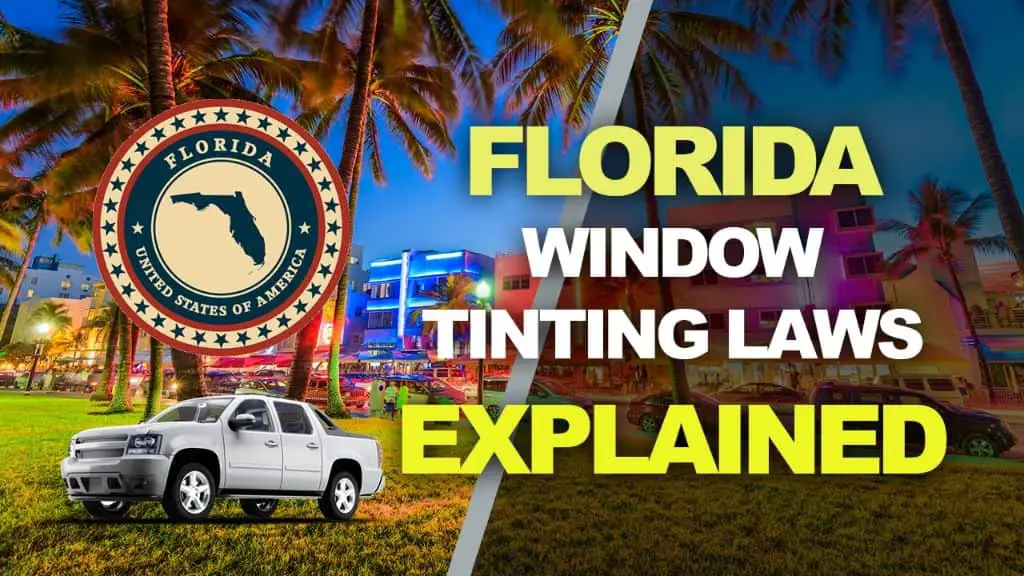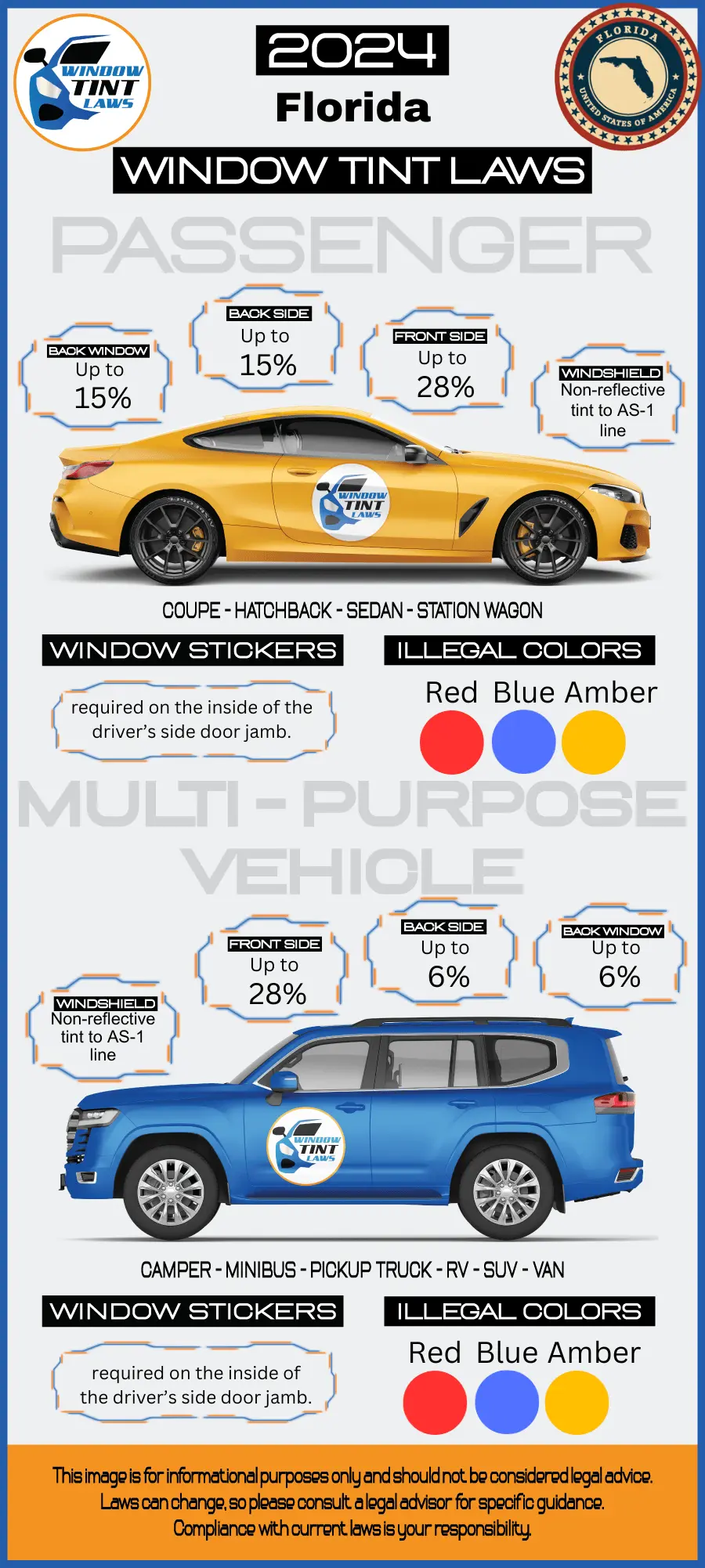
Florida Tint Laws – 2024 Updated Legal Tint Limit
Please note that Florida Legal Tint Regulations can change daily and may be interpreted differently at the city or county level. We recommend verifying this information with your local DMV or law enforcement agencies. We have manually fact-checked this content using official state resources. Florida enacted tinting laws in 1991. If any information provided is incorrect or outdated, please contact us so we can make the necessary corrections. Thank you.
2024 Florida Tint Laws – Legal Tint Limit For Passenger Vehicles
- Front Windshield: Non-reflective tint is allowed above the manufacturer’s AS-1 line
- Front seat side windows: up to 28% tint darkness allowed
- Back seat side windows: up to 15% tint darkness allowed
- Rear window: up to 15% tint darkness allowed
2024 Florida Tint Laws – Legal Tint Limit For Multi-Purpose Vehicles
- Front Windshield: Non-reflective tint is allowed above the manufacturer’s AS-1 line.
- Front seat side windows: up to 28% tint darkness allowed
- Back seat side windows: up to 6% tint darkness allowed
- Rear window: up to 6% tint darkness allowed

- Medical exemptions permit darker tints on front side windows with a doctor’s note
- Mirrored or reflective tint is prohibited on all windows. Non-reflective, dye-based films are allowed
- Florida’s tint law is statewide with no additional local regulations
What does VLT Mean according to Florida Tint Laws?
- Window tint film’s light transmission is measured as VLT (Visible Light Transmission) and each state has its own legal limits for VLT on car windows.
- A HIGHER VLT means that more light is allowed to pass through the window tint film.
- Example: a 75% tint will allow 75% of the light to pass through whereas a 5% tint will only allow 5% of the light to pass through, making the 5% tint a much darker film.
- Florida’s window tint law has specific VLT limits for Passenger Vehicles and Multi-Purpose Vehicles.
FAQ’s Regarding Florida Tint Laws and Florida Legal Tint Limit
Is 5% tint legal in Florida?
The only time that you are allowed to use a 5% tint legally in Florida is if you are Medically Exempt, you are a law enforcement agent used in undercover or canine operations or if you are driving a vehicle owned or leased by a private investigator or agency licensed under Florida tint laws Chapter 493
Can I tint my front windshield in Florida?
Yes, in Florida, you can tint your front windshield above the AS-1 line with non-reflective tint; however, tinting below the AS-1 line is not permitted.
Do I have to have side mirrors in Florida?
Dual side mirrors are required on your car in Florida if the rear window is tinted according to Florida tint laws.
Is colored tint legal in Florida?
It is illegal to use the color Red, Blue, and Amber on your windows according to the Florida window tint law.
Do I need a certified sticker from the company installing my window tint in Florida?
Florida Tint Laws require you to have a sticker identifying legal tinting, which should be placed on the inside of the driver’s side door jamb.
Are there Medical Exemptions in Florida for Window Tint?
Florida car window tint laws allows medical exemptions for special tint. For more details about the specific terms of the exemption, consult your state law.
Can I get away with 15% tint in Florida?
In Florida, the legal tint limit for front seat side windows is up to 28% VLT (Visible Light Transmission), but you are allowed to have a darker tint of 15% VLT on your backseat and rear windows. The decision to issue a ticket can vary depending on the discretion of the officer.
Can you get pulled over for 5% tint in Florida?
Yes, you can be pulled over for having a 5% tint in Florida, as it is an exceptionally dark tint that is highly noticeable. However, there are exceptions to this rule. Individuals who are medically exempt, law enforcement agents involved in undercover or canine operations, or those driving a vehicle owned or leased by a private investigator or agency licensed under Chapter 493 of Florida tint laws, may be permitted to use such dark tints.
How much is a Tint Ticket in Florida?
According to Florida Tint Laws, violating the restrictions results in a standard non-moving traffic citation with fines of around $30-$80
How to get a Tint Exemption in Florida
According to Section 316.29545, Florida State Law allows window tint medical exemptions to be given to vehicle owners for specific medical reasons including, but not limited to, the following:
- Lupus
- Dermatomyositis (Autoimmune Disease)
- Albinism
- Total or Facial Vitiligo
- Xeroderma Pigmentosum
Florida Tint Laws require you to completely and accurately fill out Form HSMV 83390 (Application for Sun-screening Medical Exemption) and include the Physician’s Statement of Certification and mail it to the following address:
STATE OF FLORIDA
DIVISION OF MOTORIST SERVICES
2900 Apalachee Parkway, MS# 72
Neil Kirkman Building – Tallahassee, FL 32399-0620
The Physician filling out your Statement of Certification is required to have one of the following credentials in order for their signature and recommendation to be valid:
- Physician licensed to practice under Chapters 458, 459, or 460, Florida Statutes
- Dermatologist licensed to practice under Chapter 458, Florida Statutes
- A physician who practices medicine in a military medical facility, state hospital, or federal prison. The Physician must include the name and address of the facility
- An advanced registered nurse practitioner licensed under Chapter 464, under the protocol of a licensed physician
- Physician assistant licensed under chapter 458 or 459, Florida Statutes
This medical exemption is only given to persons who require limited exposure to light and are permitted to have sun screening material on the windshield, side windows, and windows behind the driver which is in violation of the requirements of sections 316.2951-316.2957
You must provide one of the following proofs of identification along with your application:
- A current Florida driver’s license
- A Florida identification card
How Much Does a Window Tint Medical Exemption Certificate Cost In Florida?
A window tint medical exemption certification has a fee of $6.25 for EACH applicable vehicle. A Florida Window tint medical exemption certificate has no expiration date and is non-transferable. The certificate becomes immediately VOID and invalid upon the sale or transfer of the vehicle identified on the certificate.
For more information regarding window tint medical exemptions in Florida, you can check out this resource:
